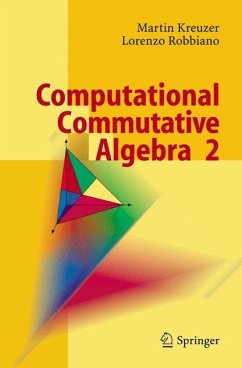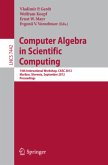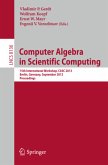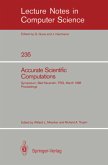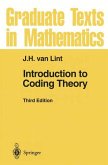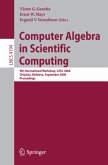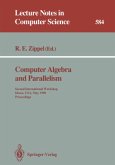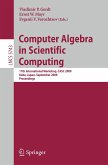This book is the natural continuation of Computational Commutative Algebra 1 with some twists.
The main part of this book is a breathtaking passeggiata through the computational domains of graded rings and modules and their Hilbert functions. Besides Gröbner bases, we encounter Hilbert bases, border bases, SAGBI bases, and even SuperG bases.
The tutorials traverse areas ranging from algebraic geometry and combinatorics to photogrammetry, magic squares, coding theory, statistics, and automatic theorem proving. Whereas in the first volume gardening and chess playing were not treated, in this volume they are.
This is a book for learning, teaching, reading, and most of all, enjoying the topic at hand. The theories it describes can be applied to anything from children's toys to oil production.
Hofstadter's Law: It always takes longer than you think it will take, even if you take into account Hofstadter's Law. (Douglas R. Hofstadter) Dear Reader, why did we begin the foreword of this second volume with the same quote as the ?rst? There we wrote that it took three years of intense work just to ?ll three centimeters of your bookshelf. The completion of this volume took four years and it is about four centimeters thick. Thus we have a con?rmed invariant which governs our writing: our velocity is one centimeter per year, after all e?ects due to Hofstadter's Law have been taken into account. When westartedthisprojectinthelastmillennium,weplannedabookforlearning, teaching, reading and, most of all, enjoying the topic at hand. Surely there is no law which says that a mathematical book has to be dull, boring, dry, or tedious. But how do you make it enjoyable? Our approach has been to ?ll it with amusing quotes, varied jokes, funny word games, ?owery metaphors and occasional literarye?orts. There are two possible drawbacks of this method. Firstly, not everyone has the same sense of humour and not every metaphor works as intended. For instance, it is easy to joke about certain politicians, but what happens if they read this book? And when we wrote of a small boat sailing slowly into the Brazilian sunset, it was pointed out to us that this entails a geographical problem. Secondly, it is very di?cult to write humorously in a foreign language.
The main part of this book is a breathtaking passeggiata through the computational domains of graded rings and modules and their Hilbert functions. Besides Gröbner bases, we encounter Hilbert bases, border bases, SAGBI bases, and even SuperG bases.
The tutorials traverse areas ranging from algebraic geometry and combinatorics to photogrammetry, magic squares, coding theory, statistics, and automatic theorem proving. Whereas in the first volume gardening and chess playing were not treated, in this volume they are.
This is a book for learning, teaching, reading, and most of all, enjoying the topic at hand. The theories it describes can be applied to anything from children's toys to oil production.
Hofstadter's Law: It always takes longer than you think it will take, even if you take into account Hofstadter's Law. (Douglas R. Hofstadter) Dear Reader, why did we begin the foreword of this second volume with the same quote as the ?rst? There we wrote that it took three years of intense work just to ?ll three centimeters of your bookshelf. The completion of this volume took four years and it is about four centimeters thick. Thus we have a con?rmed invariant which governs our writing: our velocity is one centimeter per year, after all e?ects due to Hofstadter's Law have been taken into account. When westartedthisprojectinthelastmillennium,weplannedabookforlearning, teaching, reading and, most of all, enjoying the topic at hand. Surely there is no law which says that a mathematical book has to be dull, boring, dry, or tedious. But how do you make it enjoyable? Our approach has been to ?ll it with amusing quotes, varied jokes, funny word games, ?owery metaphors and occasional literarye?orts. There are two possible drawbacks of this method. Firstly, not everyone has the same sense of humour and not every metaphor works as intended. For instance, it is easy to joke about certain politicians, but what happens if they read this book? And when we wrote of a small boat sailing slowly into the Brazilian sunset, it was pointed out to us that this entails a geographical problem. Secondly, it is very di?cult to write humorously in a foreign language.
From the reviews:
"Four years ago the authors published the first volume of a projected series about computational commutative algebra ... . Now they have gifted us with the second volume ... . In this second volume the authors continue with the same style, as the first, an almost humorous one. ... It was a pleasure to review this nice book ... ." (Paulo F. Machado, Mathematical Reviews, Issue 2006 h)
"The book under review is the second volume of the authors' 'Computational commutative algebra'. ... the book altogether covers on its 586 pages a wealth of interesting material with several unexpected applications. ... an encyclopedia on computational commutative algebra, a source for lectures on the subject as well as an inspiration for seminars. The text is recommended for all those who want to learn and enjoy an algebraic tool that becomes more and more relevant to different fields of applications." (Peter Schenzel, Zentralblatt MATH, Vol. 1090 (16), 2006)
"Four years ago the authors published the first volume of a projected series about computational commutative algebra ... . Now they have gifted us with the second volume ... . In this second volume the authors continue with the same style, as the first, an almost humorous one. ... It was a pleasure to review this nice book ... ." (Paulo F. Machado, Mathematical Reviews, Issue 2006 h)
"The book under review is the second volume of the authors' 'Computational commutative algebra'. ... the book altogether covers on its 586 pages a wealth of interesting material with several unexpected applications. ... an encyclopedia on computational commutative algebra, a source for lectures on the subject as well as an inspiration for seminars. The text is recommended for all those who want to learn and enjoy an algebraic tool that becomes more and more relevant to different fields of applications." (Peter Schenzel, Zentralblatt MATH, Vol. 1090 (16), 2006)
"[...] Die Stärke dieses zweiten Bandes der Computational Commutative Algebra liegt in den vielen Übungsaufgaben und den 55 gut ausgearbeiteten und zum Teil umfangreichen Tutorials [..]. Diese bilden eine Brücke von den theoretischen Grundlagen zu aktuellen Algirithmen und Berechnungen. Insbesondere die Tutorials sind hervorragend zum Experimentieren mit CoCoA sowie zum Selbststudium geeignet und bilden eine reichhaltige Fundgrube für Übungen und Praktika zur Computeralgebra. [...]" B.H.Matzat, Computeralgebra Rundbrief März 2006

